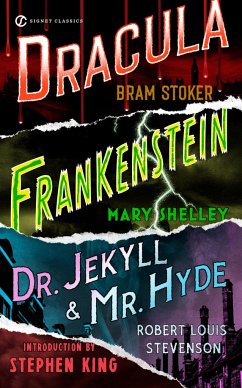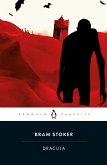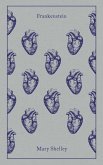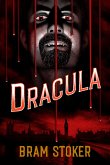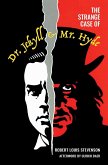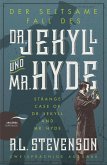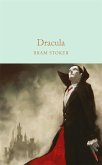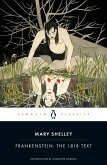Three horror icons come together in one indispensable tome with an introduction by Stephen King.
Within the pages of this volume you will come upon three of the darkest creations of English nineteenth-century literature; three of the darkest in all of English and American literature, many would say and not without justification These three creatures, presented together for the first time, all have a great deal in common beyond their power to go on frightening generation after generation of readers but that fact alone should be considered before all others. From the Introduction by Stephen King
A diabolical, bloodthirsty Count draws an unsuspecting young man into a world of terrors. A scientist oversteps the bounds of conscience and brings to life a tortured creation. A man of medicine explores his darker side only to fall prey to it. These three legendary tales have held readers spellbound for more than a century.
The titles alone Dracula, Frankenstein, and Dr. Jekyll and Mr. Hyde have become synonymous with horror. They are part of a universal language that serves to put a monster s face on the good-and-evil duality of our very human nature. Inventive and subversive, these classic tales of terror can shake even the modern reader with something far more profound than fear....
Within the pages of this volume you will come upon three of the darkest creations of English nineteenth-century literature; three of the darkest in all of English and American literature, many would say and not without justification These three creatures, presented together for the first time, all have a great deal in common beyond their power to go on frightening generation after generation of readers but that fact alone should be considered before all others. From the Introduction by Stephen King
A diabolical, bloodthirsty Count draws an unsuspecting young man into a world of terrors. A scientist oversteps the bounds of conscience and brings to life a tortured creation. A man of medicine explores his darker side only to fall prey to it. These three legendary tales have held readers spellbound for more than a century.
The titles alone Dracula, Frankenstein, and Dr. Jekyll and Mr. Hyde have become synonymous with horror. They are part of a universal language that serves to put a monster s face on the good-and-evil duality of our very human nature. Inventive and subversive, these classic tales of terror can shake even the modern reader with something far more profound than fear....

Auch ich
kann lieben
Katharina Thalbach ist als
androgyner Dracula ein Ereignis
Dracula ist längst zum modernen Mythos geworden. Seit der Erscheinung von Bram Stokers Roman 1897 hat der blutsaugende Vampir aus Transsylvanien jedoch erheblich an Schrecken eingebüßt. Heute ist er vor allem ein Sexsymbol. Eine spannende Verschiebung, zischelt doch zu Romanbeginn die weibliche Gefolgschaft des Grafen diesem ihr gehässiges „Du … kennst keine Liebe!“ entgegen. Worauf sich Dracula mit den Worten „Doch, auch ich kann lieben. Ihr habt es doch selbst erfahren. Ist es nicht so?“ nur recht zaghaft zu verteidigen weiß.
In dem kurzen Gespräch mit seinen drei bleichen Grazien offenbart sich für den Leser die ganze Tragik der Figur. Derjenige, der zu dem jetzt wiederaufgelegten Hörbuch „Dracula“ von 2012 greift, wird diese jedoch gar nicht bemerken. Aus dem einfachen Grund, weil die Stelle nicht vorkommt. Es handelt sich um eine gekürzte Lesung „nach dem gleichnamigen Buch“. Dabei hat die für die Audiofassung zuständige Franziska Mende mit großer Zielsicherheit all jene Passagen herausgenommen, die den doppelten Boden des Romans ausmachen und dafür verantwortlich sind, dass der Stoff mit seinen vielfältigen Gegensätzen, wie zum Beispiel Bewusstsein versus Unbewusstes, bis heute Künstler zu immer neuer Auseinandersetzung inspiriert.
Das „Dracula“-Hörbuch indes liefert nur die bloße Story und ist, bedenkt man den Umfang der Vorlage, mit einer Laufzeit von etwas mehr als fünf Stunden auch nicht sehr lang geraten.
Zunächst lässt einen das Hörbuch durchaus aufhorchen. Das Regieteam Melanie Möller, Inga Reuters und Franziska Mende hat den Roman mit einem Ensemble von zehn Sprechern aufnehmen lassen und nicht einfach von einem einzigen Schauspieler. Das leuchtet ein, schließlich ist „Dracula“ ein Montageroman, vor allem bestehend aus den Tagebucheinträgen von Jonathan Harker, dessen Freundin und späterer Frau Mina sowie des Psychiaters Dr. Seward, ergänzt um Briefe, Zeitungsberichte, Telegramme und einen Logbucheintrag. Zusammen erzeugt dieser wilde Textsortenmix die für die schaurig-schönen Geschehnisse typische Unmittelbarkeit, der man sich schwer entziehen kann.
Und so hört man nun Jacob Weigert zu, wie er als junger Rechtsanwalt Jonathan Harker auf dem Schloss des Grafen zunehmend in Panik gerät. Oder Jürgen Uter, der als Psychiater in eher wissenschaftlich nüchternem Ton auf die Ereignisse blickt. Auch Dracula selbst, den vor allem Harker in seinem Tagebuch immer wieder direkt zu Wort kommen lässt, hat man besetzt. Natürlich! Allerdings mit einer Frau: Katharina Thalbach. Ein kluger Schachzug. So wird der Fürst der Finsternis noch weiter ins Androgyne geschoben.
Thalbach als gebrochener Vampir ist ein Ereignis, sie knarzt leise und hart, verschleppt leiernd Worte, ja ganze Sätze. Doch weil die Schauspielerin ein so wunderbarer Dracula ist, ärgert man sich über die vielen Kürzungen umso mehr. Warum lässt man sie nicht ganz und gar Dracula sein, der, gesehen auf das Romanganze, ohnehin nicht viel zu sagen hat? Hier wurde eine große Chance vertan.
Zuletzt: Das Hörbuch beruht auf der klassischen Übersetzung von Heinz Widtmann aus dem Jahr 1908. Das heißt einiges Ungelenke wie etwa das Wort „Anwaltsschreiber“ hinnehmen. Warum man nicht auf die viel bissigere Neuübersetzung von Andreas Nohl zurückgegriffen hat, die damals gerade zum 100. Todestag Stokers erschienen ist, bleibt ein Geheimnis. Nohl übersetzt den Beruf Harkers übrigens mit Kanzleiangestellter.
FLORIAN WELLE
Bram Stoker: Dracula. Gelesen von Jacob Weigert, Katharina Thalbach u.a. GoyaLit, Hamburg 2018. 1 MP3-CD, Laufzeit ca. 310 Minuten, 15 Euro.
Sie knarzt leise und hart,
verschleppt leiernd Worte,
ja ganze Sätze
DIZdigital: Alle Rechte vorbehalten – Süddeutsche Zeitung GmbH, München
Jegliche Veröffentlichung und nicht-private Nutzung exklusiv über www.sz-content.de

